- Home
- Marilynne Robinson
Mother Country: Britain, the Welfare State, and Nuclear Pollution Page 2
Mother Country: Britain, the Welfare State, and Nuclear Pollution Read online
Page 2
If it is a tactic or strategy to select and ration the truth, in order to direct public reaction toward ends the organization considers desirable, then they have violated the most basic tenets of democracy, even while producing a spectacular vindication of the wisdom of these tenets. Sellafield is a disaster. It violates common decency and common sense. It is the sort of thing that withers under informed public scrutiny—from which, to the misfortune of this beleaguered planet, it has been sheltered in America. The regularity with which foolish and destructive policies are concealed from the public is the most powerful statement possible of what democracy could have meant to the world, if there had been the courage and patience to sustain it.
The considerable involvement of Greenpeace and Friends of the Earth, which is associated with the Sierra Club, should mean a flow of exact and urgent information about Sellafield into the American environmental movement and its publications. Something else has happened. In 1984, the Sierra Club published a book by Walter Patterson, called The Plutonium Business, which drops its tone of objective description of nuclear facilities in other parts of the world to attack a headline in the London Daily Mirror (October 1975) which said Britain was to become the world’s “Nuclear Dustbin.” This characterization is in fact commonplace and fairly precise, considering the service Sellafield performs for Britain and the world at large. Reading The Plutonium Business, one would never guess that Britain is the center of the world plutonium business. Walter Patterson is active as a writer on nuclear questions in the British press. His omissions cannot reflect ignorance. The Sierra Club should also be aware of Sellafield in some detail, if they are in communication with Friends of the Earth in Britain, since this has been an issue of overwhelming importance in Britain and Europe for a number of years, highlighted by the leukemia deaths of children on the English and Irish coasts. Friends of the Earth figures in many inquiries and demonstrations. While it is possible to imagine that these organizations do not communicate with their associates, or pool information, and that they are by intention parochial and intramural, it behooves them to make this clear, and to abstain from publishing books like Mr. Patterson’s which mislead by seeming to deal in an authoritative way with international phenomena.
The silence of the American press (there was an excellent article in Newsday by Patrick J. Sloyan, May 20, 1986) is consistent with a more general failure to report news of substance from abroad. Nothing is stranger than to live in Britain and read what American newspapers and magazines print about it. If it were the sworn duty of the American press to render the United States incompetent in every aspect of foreign affairs, our journalism would be very little different from what we have at present. The hundreds of reports about Sellafield in major British newspapers and on television yielded slight, late, perfunctory articles by Joseph Lelyveld in The New York Times and Karen DeYoung in The Washington Post, both of which concluded that it was all a tempest in a teapot, more or less. The locals (those people whose children tend to die in disturbing numbers) felt no concern about the plant, according to these articles. DeYoung notes that the many tourists “never seem to mind the site.” Times and Post readers no doubt. The anxiety, these articles agree, is all in London.
People from the area have in fact flung Cumbrian silt through the door of 10 Downing Street, and seen it cleaned away by men in radiation gear. People from the area have raised money to buy Geiger counters, so that they will not have to depend on the government for information about their circumstances. There have been demonstrations, strikes, and votes of no confidence in the management at intervals over thirty years.
Neither the Times nor the Post mentions the lake of plutonium and other radioactive substances which lies off the Cumbrian coast. Both mention alarm caused by leukemia cases too few to be statistically reliable, repeating a bitterly disputed claim by the British government; that is, by the plant’s owners and operators. In fact, one child in sixty dies of cancer in the village nearest the plant, and rates in other villages in the region are comparable. To find ambiguous these high rates of a radiation-induced illness in a radioactive environment seems to me willful at best. But the American press has a tourist-bus mentality, a keen and persisting interest in pubs and arts festivals, and will seek out what it considers “typical” and “authentic” while one example of either remains on earth, at the same time ignoring whatever fails to confirm its very banal expectations. There is nothing sinister in any single instance of failure in an institution which fails routinely.
The problem of how an enterprise can prosper, pouring plutonium into the world environment, when contamination of this kind is held to be among the worst potential consequences of a nuclear war, perplexes me deeply. I experience resistance from my hearers, as often as I raise the subject of Sellafield, even though I can document what I say from the most reputable British sources. An American marine biologist assures me that Britain has more naturalists per capita than any other country in the world. I am sure he is correct. This does not mean the British landscape or population enjoys an abundance of informed solicitude. It means that two apparently incompatible tendencies exist side by side. The character of Sellafield is not in dispute. And since Britain is distinguished among European nations for the degree of its contamination, both radioactive and chemical, it is perhaps appropriate to ponder the attributes of British naturalist enthusiams which permit, and disguise, an unaccountably brutal indifference to nature. This nation of birdwatchers and dahlia fanciers uses 2,4,5 T, the dioxin-contaminated defoliant banned in every other Western country because dioxin is, like plutonium, often called the most potent man-made toxin. Why should Britain go to the lengths it does to keep rabies out of the country, bothering over lap dogs, while importing chemical wastes? To the extent that dramatizing one highly controllable problem creates an impression of caution and fastidiousness in matters of public health, the illusion is dangerous. For just the same reason, those famous naturalists constitute the opposite of a defense of nature. Britain is a country where information about industrial pollution in drinking water is kept from the public on the grounds that divulging its composition might reveal a trade secret important to the polluting firm’s competitive success.
The reader will object that such a policy is not consistent with any reasonable conception of public interest, or even of profit. However, it is typical and pervasive. Beside Sellafield itself, I can adduce the intractable torpor of the British economy as evidence that Britain pursues a miscalculated industrial policy. Since it is no departure from the norms of Britain’s endless industrial past, there is every reason to look to its progressive effects on the public health and spirit for a cause of low worker productivity, before blaming excessive security supposedly induced by Britain’s so-called socialism, as it is conventional to do.
How and why do the British people accept this monstrosity in their midst? It is they who bear the brunt of it, after all. And they are very fluent in the language of decency, and should notice these trespasses against the sum of things to be valued in this world, from organic life to the health of children to the survival and genetic integrity of species, which include themselves and their descendants.
I have before me a “personal message” from HRH the Duke of Edinburgh, on behalf of the World Wildlife Fund, an organization presently harvesting the largesse of our wealthy country to support exotica abroad. It is part of an advertisement from Time magazine, more than half taken up by a bust of the Duke, looking the spirit of patrician high-mindedness. The text is an appeal for support in protecting the planet, on the grounds that “all life on earth is inter-connected, dependent upon the physical processes taking place in the atmosphere and the oceans,” and that “if we damage any part of it we are putting our own survival at risk.” The Duke’s reasoning is as impeccable as the knot of his tie. But he carries understatement to a wild extreme when he adds, “We need people in positions of political power to take into account the needs of nature in their decisions.” If His High
ness were to point out to Her Majesty that Her Majesty’s plutonium factory and radioactive waste dump is the biosphere’s single greatest affliction, then she might be able to pull a few strings, say a word. Who knows? A modest beginning could be made. Even a quiet elderly couple can contribute something. The Queen might refrain a little from knighting people who have distinguished themselves in the waste-dumping line, for example.
But for the British, charity never does begin at home. The logo of the World Wildlife Fund is a panda. Beguiling, and remote, and somebody else’s business. It would be more to the point if the logo were a beguiling Cumbrian child. They are the ones in need of looking after.
This advertisement is an instance of the image of reasonableness English people project very successfully. I believe they induce in themselves an enormous moral security, which always prevents them from faulting themselves for anything worse than stodginess or ineptitude or excessive vulnerability to foreign influences. Hearing themselves expound as slick as you please on every great question of the age, abhorring racism, despising the thought of nuclear deterrence, scorning nationalism and militarism, appalled at the spectacle of poverty, they must feel that their gift to the world of moral enlightenment exculpates the racism, poverty, nationalism, and so on with which their own country is grievously afflicted.
People are always inclined to accept an idealized version of their country as its soul and essence, and in cases where this encourages a correcting of institutions toward a higher standard the impulse is valuable. But it is clear that something else has happened in the case of England, because articulated values are so often diametrically at odds with practice. As in the matter of the huge population of naturalists in the most abused landscape in the industrial world, the appearance of enlightenment and benign engagement is the protective coloration for behavior that is marked in an extraordinary degree by the absence of both.
It is not fair to blame the British for deception, when our own press and environmentalists have simply failed to make use of readily available information. Neither does it seem fair to speak of British hypocrisy, since the virtuous utterances with which they chasten and adjure us all are the speech of a people who believe most sincerely in their own decency, from which they do not seem to feel they have departed when they pour a little more plutonium into the environment. They interpret their problems always as arising from an excess of virtue. They are too mild, too courteous, too cautious, too respectful of tradition, too imbued with non-materialist values, too offended by the spirit of competition. Burdened as they are by all this decency, they must cut a few corners to hold their own against other nations not similarly handicapped. In 1976, after extensive discussion of the threat commercial plutonium production would pose to the environment, national security, global stability, and democratic institutions, the Times observed editorially that if a plutonium economy developed, no country would be immune to its effects. In other words, the dangers of the trade were too great to act as a deterrent, since for Britain to abstain from it would supposedly not reduce them.2 This is typical. Imagining the worst of others, Britain can be the first into the field in the darkest endeavor, confident that the harm it does is excused by being inevitable in any case.
Poisoning the well might seem a radical step, but it is really an established practice never departed from, a bit of nineteenth-century tradition. Industrial poisoning is much older than any concern about it, after all. And the Victorian period, the height against which the British measure themselves and their decline, was a period of utter rapacity. It was during those same brutal decades that the arts of moral refinement were brought to an exquisite polish in the drawing room and the novel. People now regard those days with nostalgia of an especially urgent kind, Americans as well as British, and they forgive eagerly all the wretchedness that consumed the lives of most people, in admiration of the sonorities, the niceties, the modest elegances developed over against the misery out of which these rarefied experiences were created. It sounds churlish to point out that Jane Austen’s landscape teemed with starveling agricultural laborers, whose misery seems to have been complete, just as it does to note the discrepancies between the wise and gentle urgings of the Duke of Edinburgh and the profit-motivated violence toward the earth committed by his own government. There is a prettiness that takes precedence over reality, that commands a higher loyalty, that readily takes on attributes of moral normativeness even while the conditions of its existence are peculiar and exclusive, violent and corrupt.
If the spectacle of high-mindedness did in fact create norms and refine standards of behavior, Britain, so replete with high-mindedness, would not be profiting from a special willingness to dump toxins over its landscape. Presumably Japan ships its detritus from the other side of the world because no one nearer home can be found who is willing to accommodate it. So Britain’s position in the world is apparently rather singular. Its exceptional moral facility actually corresponds to an exceptional willingness to expose its population to harm and hazard others will not bear. (The British government would argue that these wastes pose little risk—that is inevitably the defense—but then the preference of sophisticated nations for dumping them abroad is hard to account for, as is their willingness to pay generously to be rid of them, the source of the very profitability by which, in the mind of the British government, this industry is justified.)
I suppose our situation in America is essentially colonial. As colonists we were the groundlings of other societies, and we are still overawed by the squire, gawkishly eager for a nod or a word. At one time enthusiasm for the common man seemed to be abroad in this land, although we have never been the democrats we claim to be. Now, increasingly, ordinary people, those who are not educated or highly skilled or affluent, are represented as a great reservoir of pathology, crudeness, belligerency, vice, and malice. Everything disturbing in modern culture has been ascribed by the people who deal in such great questions to this hopelessly corrupted mass—one of the great events in the history of intellectual dishonesty.
The cultural origins of our problems are not to be found in the folkways of the powerless, dire as these are at worst. They are not to be found in criminality of the kind that makes us fear dark streets. Young men who yield to the furies and are hostile and violent are no problem beside the phalanxes of diligent operatives too well paid and respected to imagine themselves capable of any antisocial act.
It is clear that American scientists and journalists are aware of Sellafield. Academic specialists from this country have testified at inquiries in Britain into the effects of radiation from the plant. These experts reliably assure the British that radiation is deleterious, and afterward seem to feel that their obligation has been discharged. But the tacit connivance of their silence is simply typical of the response of the thousands of Americans who must by this time know about the plutonium dump off England’s coast.
So very much misfeasance is not compatible with the idea of actual conspiracy. I incline to ascribe it to a flaw in our national character. Americans abroad hope so wistfully for approval that they are in effect seduced by the least acceptance, and dashed by the slightest rejection, a weightless people incapable of seeing and judging, as if stuck forever in the most desolate straits of adolescence, merely wishing to be liked and accepted, considering the world well lost if, before the lights go out, they can have a murmur of approval from some foreign person.
This nullity is more contemptible than honest crime, not only because it is a greater falling off from standards of personal dignity, but also because its consequences are more disastrous by any mode of reckoning. The young men who crack heads and strip cars in our dark streets make no claim for themselves as moralists. Atlanticists, on the other hand, make very great claims in that line, taking themselves to be enlightened precisely by exposure to a gentler, worldlier, and less materialist value system. They presume to pity those bad young men who are not, like themselves, refined by experience and civilized by education. The
y fret because at random babies are fathered and neglected and become in their turn bad young men. They do not fret that babies are poisoned in the womb. That is the work of fine old men, in a land of naturalists and dahlia fanciers—gentlemen who never raise their voices, and whose dress is as reserved as their manner. To call what such men do violent, or corrupt, or degraded, involves a great wrench. The difficulty is merely a measure of our error in fixing our fears on the crimes of the powerless, while grave public men poison the cup we all must drink from sooner or later. In America, we consider it a crime to contaminate the environment for profit. In Britain, profit is considered a public benefit that justifies any means by which it may be realized, every industry being defensible in the degree that it is profitable. Americans in Britain apply British standards, without reluctance and without cynicism, at the same time heartily glad to have shaken the dust of capitalism from their feet, to have come to a place finally where profit is no god, to a non-violent society, a community of goodwill and mutual obligation. For this is, despite all, how Americans persist in viewing England.
The same Observer article that describes the flood of toxic chemical wastes from the rest of Europe into Britain ascribes to the government two defenses of this flourishing industry. The first, inevitably, is that to curtail it would cause unemployment and economic dislocation. There is a company in Liverpool with ships built for the job of dumping toxins into the North Sea—a British specialty. To disrupt this enterprise would be a great loss.
The second defense is that if waste dumping were banned, the dumping would only be done secretly, depriving the government of tax revenues, I suppose, since legal and illegal dumping of toxins can hardly differ greatly in any other way. If organized crime were to take on this profitable service to the industrial economies of Europe, what would it do differently? The government is in effect giving notice that it will not effectively enforce any ban on the dumping of toxins—reasonably enough, since it is willing to tolerate and defend the practice. In other words, government policy will prevail through act or omission. A laissez-faire government can practice tyranny by default. This theme will recur.

 Housekeeping: A Novel
Housekeeping: A Novel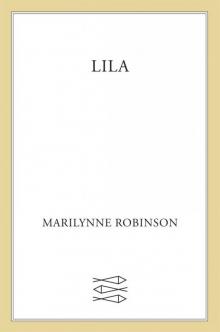 Lila
Lila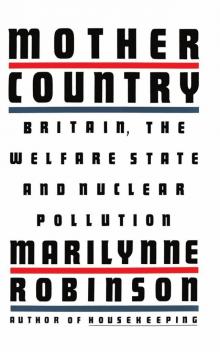 Mother Country: Britain, the Welfare State, and Nuclear Pollution
Mother Country: Britain, the Welfare State, and Nuclear Pollution Gilead
Gilead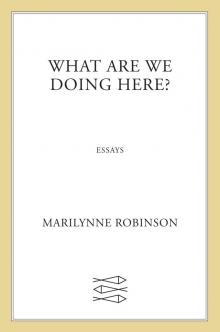 What Are We Doing Here?
What Are We Doing Here? Home
Home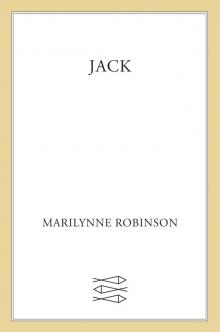 Jack
Jack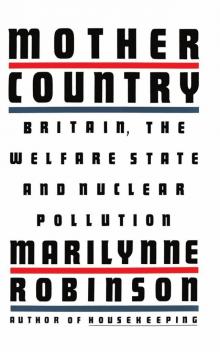 Mother Country
Mother Country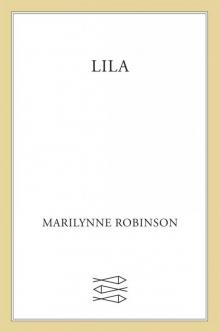 Lila: A Novel
Lila: A Novel Gilead (2005 Pulitzer Prize)
Gilead (2005 Pulitzer Prize)